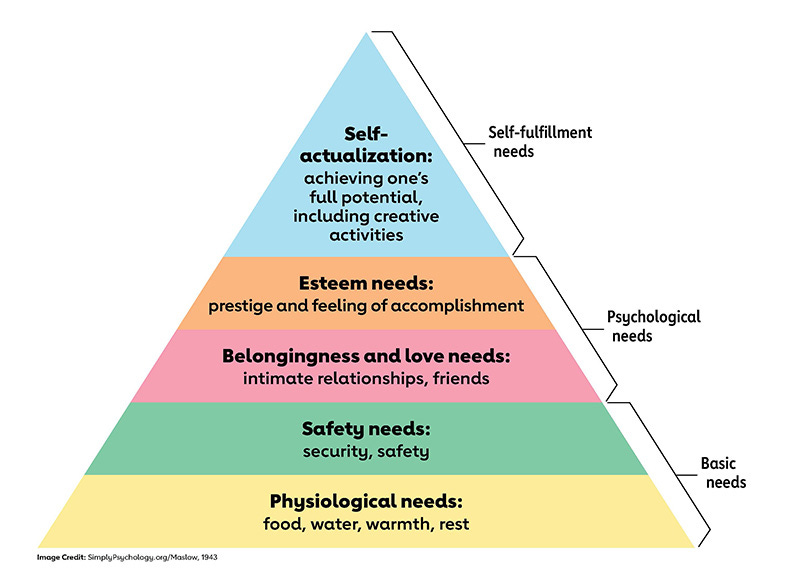The Maslow lowdown
Candidate attraction from needs
I expect most people have come across Maslow’s Hierarchy of Needs.
If not, this is what it looks like:
Abraham Maslow first developed this model in his 1943 in his paper ‘A Theory of Human Motivation’. The theory states that people are motivated to fulfil their needs in a hierarchical order, starting from the bottom of the pyramid and working up.
As you can see, it’s incredibly outdated, with no mention of LinkedIn or binge-watching.
At the very top of the pyramid is what can also be described as the Ikigai of the Purpose Venn Diagram.
While it may be an oversimplification to meet the needs of a diagram, why wouldn’t you think about how it explains candidate behaviours and decisions in recruitment?
For their aspirations, how they solve their problems, and what drives apparently out-of-character behaviour?
Let’s start with that last point - how might Maslow explain what we complain about when it comes to candidates?
If someone needs a job to pay the bills, feed the mouths and heat the house - what will they sacrifice to achieve this basic need?
Burning bridges?
Their aspirations?
Their psychological safety?
What about their safety needs - does your recruitment process make them feel psychologically safe to share bad news with you? Or is it easier to ghost?
Will people put up with the wrong culture to meet their basic needs?
What will then stop them from moving to a better role, which allows them to meet their Psychological Needs?
How about someone who wants the job so badly, and thinks they are objective, but once they meet their basic needs, they find it doesn't meet the rest?
Is that a lesson in not trying to get a bum on a seat, but instead hire the right person where they thrive, rather than run away at the right opportunity?
How about that second point - problem-solving?
Most people have a problem, even if they don’t know it.
Perhaps their job is brilliant. They love the team. But unknowingly their salary is below par, and perhaps only because the business has limited means.
Would a £Competitive Salary on a Job Title advert pique their interest, or the interest of their other half who sneakily keeps an eye out, and knows what bills they are struggling to pay?
A brilliant job, but so 9-to-5 - there isn’t another way is there, for someone who doesn’t bother reading opinions on socials?
Unless you lead with flexibility in your message.
Or how about a great team, and a well-paid job, but their ambition is starting to outgrow their situation? They aren’t actively looking, but open to receiving a message.
Why wouldn’t you try and find out what they are missing, and show how you can help?
Rather than show a brilliant job with a progressive company, which in their mind is what they’ve had.
Of course, self-actualisation is individual to the person - who can know what really makes someone tick. Unless you either ask, or you show exactly why your role offers that, and if it aligns, they might self-select.
And that first point - aspirations.
Appealing to someone’s aspirations, which may be lofty goals, or something more prosaic, is a fine endeavour in any message. Interest and Desire are two key steps in AIDA, of course.
But how can you really know someone’s aspirations without making that your first goal in any conversation?
If you lead with a pitch, it’s down to fortune whether what you offer meets their aspirations. Even then, it’s an aspiration skewed by the pitch.
If you lead with the question, you can assess their aspirations first, then either qualify them out (which is a good thing) or show them how your offering meets their top-of-pyramid needs.
Framing candidate needs through this hierarchy explains a lot of behaviour and decision-making of candidates.
Thinking about how a role may meet these needs, and interpreting with meaning, can be the crux of how we engage candidates.
I’ve no doubt, something similar can be done from the employer side in their candidate needs.
I wonder what that would look like?
Food for thought.
Regards,
Greg
P.s While you are here, if you like the idea of improving how you recruit, lack capacity or need better candidates, and are curious how I can help, these are my services:
- Go-to-Market, operational and technical key hire recruitment
- manage part or all of your recruitment on an individually designed basis for one client. Get access to an expert recruiter without the cost of a full time hire. Save money, save time, hire better candidates.
- recruitment coaching and mentoring
- recruitment strategy setting
- outplacement support
Just hit reply to check if my approach is right for you.

